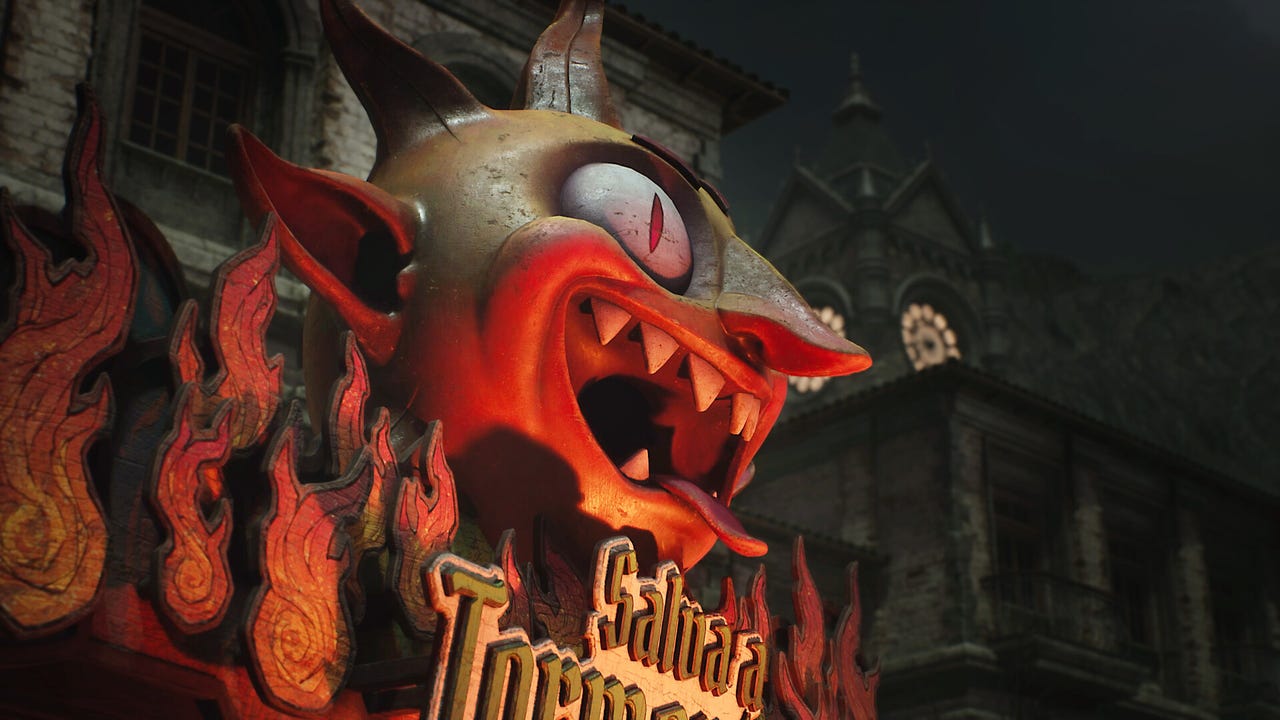Why folklore is vital for Cristol: Theater of Idols
Before signing with Blumhouse Games, Vermila Studios struggled to pitch its Spanish-facing project without compromising its identity.
Crisol: Theater of Idols, the debut project from Spain-based developer Vermila Studios, is a Spanish-facing survival horror shooter. The creative direction, permeating enemy designs, architecture, and even the language of signage outside facilities of interest are all rooted in the cultural influences that the team grew up within.
This identity, as CEO and co-founder David Carrasco told Game Developer at Tokyo Game Show, was a hard sell for some when searching for a publisher.
"Without saying names, some mentioned it, but one specific publisher asked us to translate the signage to English," Carrasco said. "To us, that was almost untouchable, because if we're trying to propose a game with Hispanic folklore and with such a strong traditional component, doing so would dramatically decrease its veracity. It's like making a game with Samurais where everything is in English."

Even amidst visual references and signage in Spanish, Carrasco said the team worked on the concept of Crisol with an international audience in mind. For example, if a player approaches one of these signs, an in-game caption translates them. But some publishers expressed zero interest in this, or in the cultural aspect altogether.
"There was one publisher who said, 'but who's gonna be interested in Hispanic culture, in Spanish culture?,' to which we said, in God of War, who's gonna be interested in Vikings? You don't need to be knowledgeable of Hispanic philosophy or art history to want to play Crisol. But you put these things in there and there'll be people who will be interested."
Vermila has been working on Crisol for over five years, with the game slated for launch in early 2026. Embracer Group acquired the studio in August 2020 for €0.9 million (around $1.06 million at the time), and according to the official site, the team also received a MegaGrant funding from Epic Games.
The survival horror of scope creep
As time passed, Carrasco explained that the studio's debut project considerably grew in size. For reference, the team is composed of 20 people and some contractors. Vermila then reacquired itself, and spent what Carrasco called a considerable time looking for a new publisher.
"We've already suffered in the desert, but given the chance to do it all over again, I'd have probably made a smaller project, something we could have tackled in two to three years," he said. "But in the end, with this being such a big project with a small team and such a high production level, it had a strong impact when we started looking for funding and [to] garner publisher interest. You're not saying, 'I need a small amount of money,' you're saying, 'not only do I need a much bigger amount, but instead of projecting this game six months from now, it's going to take two years.'"
Carrasco said Vermila signed with Blumhouse Games around a year and a half ago, and that the publisher has granted the team "tremendous" creative and artistic freedom. The developer had a second "finalist" in mind that offered a similar approach, but as Carrasco explained, finding publishers willing to grant this autonomy is far from easy.
"There are publishers who take a look and say, I want this graphics quality, I'm very interested in the mechanic about using blood to reload weapons, and I see you build levels well, but I really don't care about those Spanish things," he said.
Carrasco recalled a publisher's suggestion to center Crisol around an undisclosed country's civil war. He argued that it's better to speak about what you know and what you grew up with, as opposed to another country's culture.
But some of the proposed changes sought to alter the game almost entirely. According to Carrasco, Vermila was asked to replace the game's religious statues with zombies or soldiers. When he tried to counter that doing so would drain the meaning from the story and original concept, he was told that "it has the meaning that I want, because I'm the one who has the money."
Publisher pressure can crush authenticity
As anecdotal as these conversations are, Carrasco emphasized the serious pressure of having to make decisions to keep the lights on, and how that can sometimes compromise a project's creative vision.
"As you search for publishers who give you more freedom, the closer you're getting to the end of your capital, the less you start caring, because what you want is for the company to stay alive and to at least release the game in the best possible state," he said.
While he wouldn't call it a common occurrence, he said there are many companies who see an opportunity to make money with a game, and feel entitled to ask for changes because they can offer five, 10, or 20 million dollars. Going back to the example of the publisher asking to translate the signage to English, Carrasco said he would have made the compromise if he didn't have another choice, even if he wouldn't have been happy about it.
"Accepting certain fundings is dependent on the current situation of a studio and the state of a project," Carrasco said. "In many cases, they can turn your game into something much more generic or simplified that is drowned in a sea of projects with a similar style or genre. But perhaps that publisher makes the most sense and, well, if you have the financial need and don't have the money to stay afloat, then you have to start making decisions that oppose your artistic goals."


